“Don’t cry because it’s over, smile because
it happenedit’s over.” —Dr. Seuss, Us
Welcome back to Gretchen and Elizabeth’s the salt-cake and tea party The 100 Retrospective, Part 2! Get ready for the long haul (this is longer than Elizabeth’s senior thesis, so fair warning). We have a lot to say about characters. So much, in fact, that despite us declaring in Part 1 of our retrospective that we’d also tackle themes and conclude our thougths on the season this week, we actually will now be giving that to you in a “Part 3”. It’s almost as if the characters are something we care a lot about in the shows we watch. #sorrynotsorry
Characterization
Might as well start with Jason Rothenberg’s favorite protagonist in all his unrecognizable glory.
Bellamy

This season ought to have been titled the Character Assassination of Bellamy Blake. His defection to Pike’s hateful, xenophobic rhetoric and the slaughter of 300 innocent Grounders have been the source of endless frustration rage for those of us in The 100 fandom who like character consistency. He goes from non-lethal force (3.01) to massacring Grounders (between 3.04 and 3.05) faster than you can say “Oh crap, we just killed our allies.”
His defection lacks adequate motivation. He pulls away from Kane starting in 3.02 for literally zero reason. He blindly follows Echo’s warnings and walks his team into a trap after having not seen her for three months because he trusts in the camaraderie they had in Mt. Weather. His actions threaten every Skaikru individual in Polis and leads to the death of significant numbers of Farm Station and his girlfriend.
Instead of investigating afterward, he turns to hate. Recall that prior to Echo approaching him, he hears about Azgeda’s cruelty from Pike. He knows from Indra that Queen Nia has it out for Lexa. Yet, when he is betrayed by Echo, he does not connect these pieces of information. He chooses instead to blindly hate and distrust all Grounders. He’s a smart guy; not connecting the dots is extremely out of character for Bellamy.

His failure to connect the situation with Echo to what follows with Pike is even more out of character. Like Echo, Pike needs Bellamy to help him with a mission, for the good of their people. Both ask Bellamy to trust them, no questions asked, relying on Bellamy’s loyalty, protective instinct, and ability to follow orders. Yet Bellamy, history nerd and leader of many a battle against the Grounders, does not stop to think about the fact that Pike is Echo 2.0. Or the fact that the attack is strategically stupid.
The army they attack is Trikru, not Azgeda, a clan with whom they are currently in alliance. Skaikru has struggled in the past with pitting their smaller numbers against the Grounders, and that was against Trikru alone. Bellamy has seen the Azgeda army for himself and knows Skaikru can’t win against them, much less if the entire Coalition came against them. Nevertheless, he decides that Pike’s attack on Trikru is a masterful plan. We love how ellewoodsharvardvideoessay put it:
“like, he was in a war against the capulets, and an alliance with the montagues, and the guy decided to go and kill 300 montagues???”
It’s utter nonsense and completely out of character, but convenient for the plot. His distrust is what moves him to side with Pike beyond all reason. It insults his intelligence and the audience’s. The audience is then treated to the barest hint of a ‘redemption arc’ that we’re expected to embrace and cheer for despite the lack of motivation to do so.
Bellamy’s breaking point is not the destruction of 300 defensive soldiers or even the thought of massacring an entire village of peaceful, non-combatants. Clarke pleading with him, apologizing for hurting him and others—not enough. His own sister confronting him about his problematic choices and pointing out that his decisions affect her and the man she loves. Not enough. Pike sentencing Kane to death for treason. That’s his breaking point. Because one Skaikru is worth more than 300+ Grounders and his relationships with his family and friends. Okay.

What follows is a series of Bellamy acting alternately petulant and like a martyr. He refuses to allow Kane and Sinclair to stop Octavia from beating him (3.09), but whines when she hasn’t immediately forgiven him a few episodes later (3.13). He puts the blame for Lincoln’s death on Octavia for not trusting him, but admits he ‘might’ have blood on his hands to Clarke. He’s not conflicted; he’s inconsistently written.
He never admits killing the 300 was wrong, but we’re supposed to believe he’s changed because he waxes eloquent about non-lethal force and revenge being wrong in the finale. He never apologizes to Clarke for how he treated her, but he says he might not be the ‘good guy’, so we’re supposed to accept it because moral ambiguity. He never repents of his hatred and violence. He justifies his choices to anyone who will sit still long enough to listen. But everyone on the show forgives him, so the audience should too.
This lack of consistency regresses all of his significant relationships. He tells Octavia that she will “always fit in with him” (3.03), but does not stand up for her when Pike makes a sexist comment about her being ‘spirited.’ The early scene of brother-sister bonding becomes irrelevant when he chooses Pike’s campaign over her, destroying the culture she identifies with without qualm in the process. Not once do we see him make the connection that labeling Grounders as enemies makes an enemy of his sister, Lincoln, and his growing father/son bond with Kane.

As for Clarke, at the end of S2, he’s disappointed at her choice to seek peace by leaving Camp Jaha, but accepting. This season, he labels this same act abandonment. He gets angry when she decides to stay in Polis, even when she explains that she’s doing it to prevent Lexa from betraying them. He emotionally manipulates her, blames her, handcuffs her to a pole, and prepares to hand her over to Pike “for her own good.”
Once reunited, rather than apologize, both he and the narrative ignore his previous actions in favor of Clarke accepting him back without suspicion or recrimination. This despite the fact that Clarke has never been one to let Bellamy’s questionable actions slide. As nice as it is to see the gang back together in 3B, we wish it didn’t come at the expense of Clarke’s character or require Bellamy to act out of character for an entire season.
We could have bought this arc if it had been given adequate buildup, exploration, and sensitivity. As it stands, Bellamy acts like a total pos for half a season, murders a bunch of people, then gets ‘redeemed’ by moping about people not forgiving him and saying sorry half-heartedly like, twice. Oh, and by expositing to Octavia about how revenge is bad.
We would have liked to see him express remorse to Octavia for Lincoln, not self-righteous preaching. He admits he might be responsible but to Clarke, not Octavia. You know, the one whose lover he supposedly feels responsible for killing. While we’re dreaming, can they have him apologize and express real sorrow for murdering innocent people and chaining up one of his best friends?
Clarke
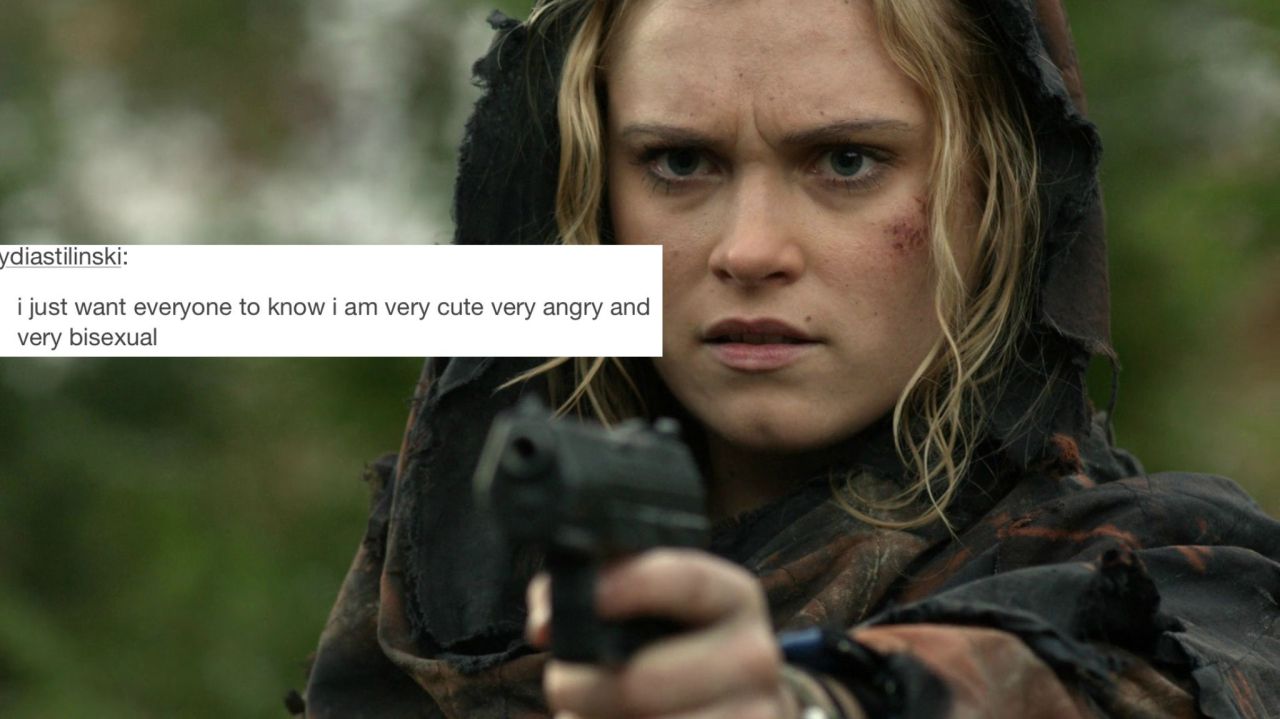
It’s unfortunate that the show was not abruptly cancelled after episode 3.07, because at least one of our protagonists could have made it to the end of the season completely in character. Unfortunately, 3B happened, and though Clarke Griffin’s empty husk lead the Delinquents through the second half of the season, her soul died right alongside Lexa.

It’s difficult to write about Clarke’s character arc this season, because she effectively ceases to have one after 3.07. The first half of the season started out very strongly, with Clarke living an isolated hunter-gatherer existence in what could reasonably be called a dissociative episode. This is consistent with how she left us in the previous season, having explained to Bellamy that she cannot handle the guilt she would feel living amongst the people who she killed hundreds to save. She is friendly, yet extremely distant, with Niylah, the only human she has consistent contact with during her self-imposed exile. Only in the context of unavoidable physical contact (Niylah cleaning her wounds) does Clarke open up a bit, though she shuts herself off emotionally in exchange for physical connections.
Up until she is brought to Polis by Roan as a prisoner, Clarke has been stuck in ‘survival instincts’ mode, with a few glimmers of deeper emotions shining through the haze. The catalyst for bringing Clarke out of her largely dissociative state is, of course, our beloved Heda Lexa Kom Trikru.
In that moment, about three months of pent-up rage comes boiling out to the surface, and if she were not forcibly restrained Clarke could have killed Lexa with her bare hands. This ends the Disassociation Period of Clarke’s character arc this season, bringing back the Grudge Holding World Champion we know and love. Clarke Griffin is a lot of things, but forgiving is absolutely not one of them.

Despite being full of fire and brimstone, Clarke is unable to go through with killing Lexa. Her week-long emotional roller coaster ride seems to have been the cathartic cure she needed, because when Kane and Abby arrive in Polis, Clarke is back to her manipulative Slytherin self. Let it be said that this is not a negative thing; Clarke’s greatest assets are her cleverness and cunning. It’s what makes her a great tactician and a great leader, and she doesn’t use her power for evil (though she does use it for self-interest). Clarke expertly maneuvers the treacherous political waters, and pays no mind to the sharks circling, because she knows she is the apex predator in this room.
If she is hurt by Bellamy’s insinuation that she is abandoning her family and friends by staying in Polis, she doesn’t show it; she is a warrior diplomat, and politics are her battlefield; she can best protect her people in Polis. Clarke is calm, collected, and in complete control of her emotions. And then this happens:
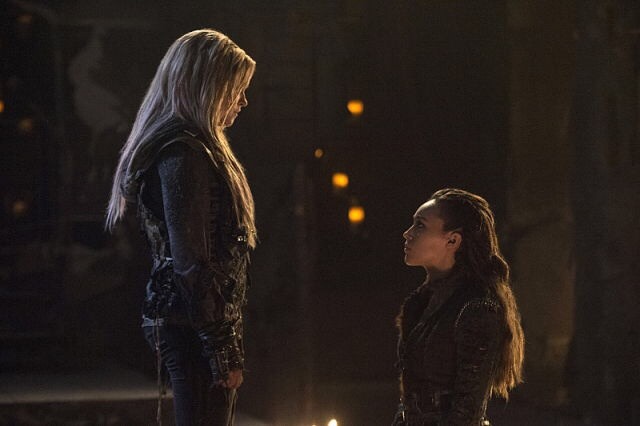
In this moment, we see Clarke do something that she has never done before; she gives Lexa her trust and the benefit of the doubt, despite Lexa’s betrayal at Mt. Weather. One could reasonably argue that this is a political maneuver, but that’s not what Clarke’s facial expression and vocal inflection is telling us. When she asks Lexa not to betray her people, what she really means is “Don’t betray me.” In this moment, Clarke is vulnerable, and that is a very rare thing indeed.
Despite her hesitation, Clarke chooses to take a chance on letting herself care about Lexa; very, very slowly, but still inching forward (much to Lexa’s great relief). Though the process happens quite quickly due to the timeline compression of S3A, it is still a process. For the first time since season one, Clarke gets to be herself, and has something to ease the burden she carries on her shoulders. She too, in turn, does the same for Lexa, and watching the two of them cautiously and awkwardly grow together is wonderful.
Unfortunately, all happy things must end on The 100; when Lexa and Clarke stumble upon the slaughtered Trikru protection force, Clarke is thrust into the awkward position of advocating for leniency for her people despite being clearly aware that they don’t deserve it. She argues with Lexa with a level of honesty and passion that hasn’t been seen before from Clarke; she is more or less begging for mercy. Fortunately for Skaikru (and unfortunately for the Grounders going forward) Lexa has changed too; she accepts Clarke’s proposal, in hopes that a demonstration of mercy will beget peace.
This gesture is put to the test in the very next episode when Roan sends her Emerson, the last of the Mountain Men. Now confronted with a face that has surely haunted her dreams ever since the events of Mt. Weather, Clarke lets her hatred get the best of her. She demands retributive justice. Lexa’s accusation, “So blood must not have blood applies only when it is my people who bleed,” shames Clarke because it is an accurate reflection of her values. She will plead for mercy for her own people, but demand justice when they are wounded. It’s a kind of hypocrisy we can all relate to, and something we’ve always loved about Clarke.
Yet, when confronted with her own hypocrisy, instead of owning it and demanding justice anyway, Clarke decides to change. She had pled for mercy for her own people, who was she to not extend it to Emerson? This is a huge moment for her as a character; from season one, one of Clarke’s primary character traits has been her inability to forgive. She hates Wells for betraying her father, then her mother when Wells admits he lied to protect Abby from Clarke’s (understandable) wrath. With Emerson, Clarke makes the choice to show mercy; she does it begrudgingly, but honestly. She is growing as a person, despite the chaos and darkness around her, and it’s all thanks to Lexa.
This comes to a head in the final hour, as Clarke and Lexa must say their goodbyes to each other. You can just feel the unspoken ‘I love yous’ perching on their shoulders like vultures. Fortunately, words aren’t everything.

They say their goodbyes, the audience swoons, and then…. Lexa dies, and Clarke dies with her. Not physically; her body is still moving about the plot for the rest of the season. But all of the progress she had made, the positive character growth, and the strength she earned, either disappears or is twisted into something awful.
Clarke’s merciful turn with Emerson is the most violently twisted when he comes back to wreak his vengeance on her and her friends (3.12). Her act of mercy culminates in Sinclair’s death and the kidnapping and partial suffocation of several of her friends. She and Bellamy both blame her for being merciful; if she had just killed Emerson when she had the chance, none of this would have happened. Before this moment, Clarke still had some of that bitter fire in her, which you can see in 3.11 when she gets frustrated with Raven/ALIE. But after killing Emerson, something seems slightly ‘off’ about Clarke for the rest of the season.
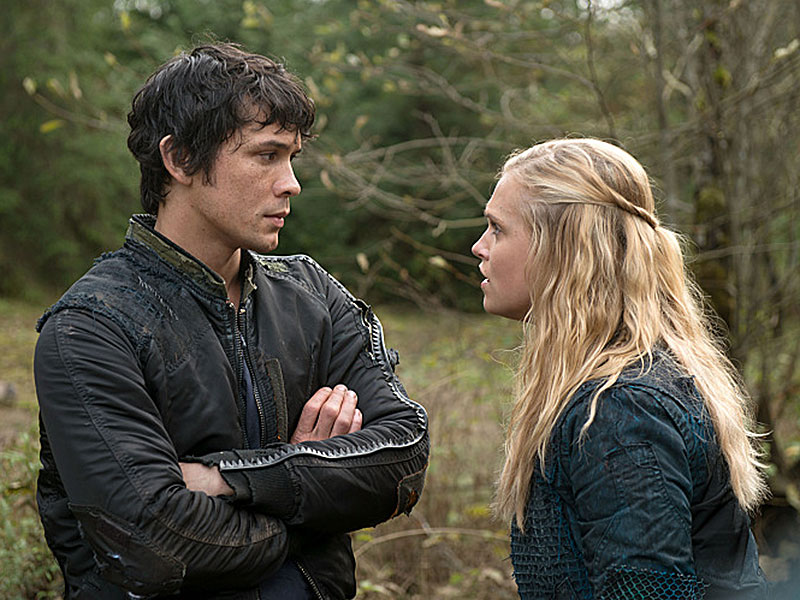
She is uncharacteristically submissive when she talks to Bellamy in 3.13 and in several following it. (We refuse to believe that Clarke Griffin would excuse the murder of 300 people as a necessary consequence of the morally ambiguous nature of life.) One moment she is bravely attempting to force Luna to take the chip. The next she is stomps off into the woods in anger after The Gang gripes about her plan (though we understand her frustration).
In the cold opening of the finale, Abby begs for Clarke’s forgiveness, and Clarke reacts with disturbing professionalism. While Clarke has always been deeply skilled at compartmentalizing emotions, this is an entirely new level of disassociation for her. She is able to, rather coldly, regain control of herself and explain to her mother what must be done. Her behavior is frighteningly robotic, in a way that had us deeply worried that the ‘big shock’ of the finale would be Clarke jumping off the Polis tower.
Then, Lexa returns to her in the City of Light, and for five glorious minutes, Clarke returns as well. For five minutes, Clarke was a human being again, with emotions and a soul and smiling muscles! It’s short lived, of course, as Lexa was scripted to die. Clarke makes a passionate speech about the nature of free will (we’ll talk more about that later), but swiftly reverts to the husk she’s been for the majority of S3B once she enters the Citadel. Her conversation with Becca and ALIE feels hollow and contrived; there’s no weight to it. ALIE offers Clarke freedom from her pain, she refuses, of course. She is completely numb already. As Melanie cleverly suggests, if ALIE wanted to get a reaction from Clarke, she didn’t need to offer her an end to pain; she needed to offer her Lexa.
But alas, the writers are not that clever. Clarke pulls the End Season Lever for the third time in the show’s history, and the Commander’s chip is removed from her neck, taking Lexa with it. All around her, Clarke’s friends celebrate in relief that the ordeal is finally over, but Clarke is devastated. She tells Bellamy that her gloom is because of the impending nuclear doom, but the audience knows better: Lexa is gone forever, Bellamy is a murderous shadow of the man Clarke once called a friend, Jasper was one last-minute edit away from blowing his brains out in the Jeep, the wedge between her and Octavia will probably never be mended, and less than an hour ago she got to watch her mother almost hang herself to death. That’s not the face of a woman who is worried about a future crisis; that’s the face of a woman hitting the rock bottom of depression and despair.
At the end of season 3, we are left with a Clarke that is so broken that we’re not entirely sure she can be fixed. At this point in the show, Clarke has had to watch three people she loved die right in front of her: her father, Finn, and Lexa. She saw both her friend Raven and her mother almost die by suicide. She lost her best friend, Wells, back in season one to a senseless killing. While Clarke would probably not say she was close to Lincoln, she has been friends with him for three seasons now, and she also has known Sinclair for at least as long.
In this way, the portmanteau Wanheda is darkly accurate; Clarke is the Commander of Death, not in that she necessarily causes it, but that she is constantly surrounded by it. Not that you’d know she was troubled. This season, she’s only allowed to address her pain or guilt insofar as it serves the needs of other (almost always male) characters, like Jasper and Bellamy.
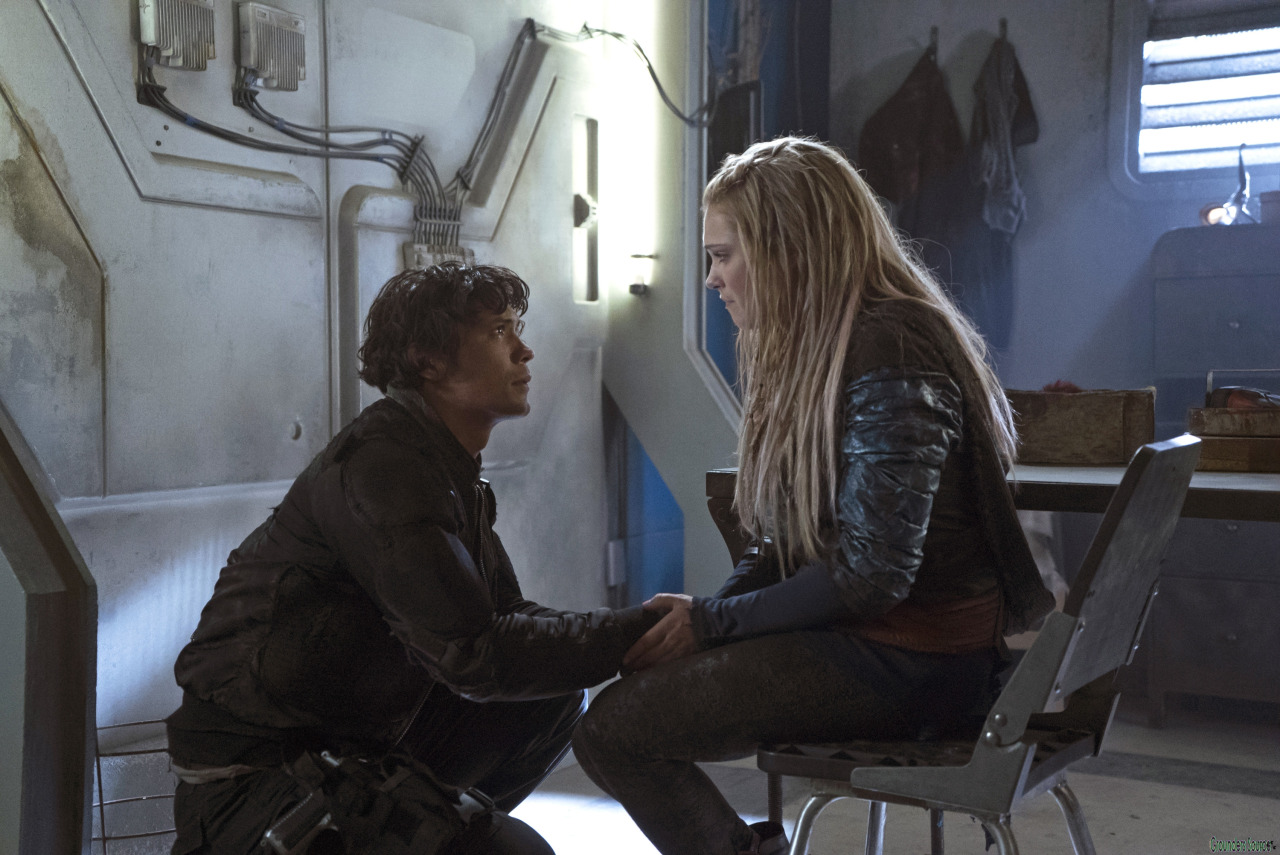
She also receives the lion’s share of the blame for Mt. Weather, and is forced to apologize several times for what happened. This despite the fact that Bellamy, who was equally to blame for pulling the lever, never one apologizes nor is he ever blamed for it. Raven mentions his involvement, but the context is his not receiving “credit”, so that hardly counts. She’s the leader so she must shoulder all the blame, even if others are involved.
This would not bother us so much if it actually serviced her healing arc, but it never does. It is always done to soothe someone else’s pain, not to allow her to process her own feelings. Bellamy gets to rail at her, berate her, and say she abandoned him. Jasper accuses her multiple times, and as harshly as possible, of murdering his girlfriend. He resents her very existence in his proximity. She offers a genuine, heartfelt apology to him, and he literally tells her to shove it. (Never once is he this rude to Bellamy, btw).
It is at this point that we feel the necessity to remind everyone that Clarke is only barely an adult; to have seen this amount of violence and death at such a young age is incredibly damaging, and it’s a wonder that she managed to adapt as well as she did up until season 3. At the end of the season, we are once again left with the empty, soulless husk that answers to the name Clarke Griffin; and the plot that begat this was definitely not worth what it put Clarke through. Clarke deserves rest. She has unaddressed PTSD and now the loss of a loved one. She’s in bad shape, but what do you want to bet that S4 will in no way address it. What even is trauma?
Raven

Poor lil birb Raven. Why must they make her suffer? She began the season with plot convenient hip pain—acquired offscreen—and down one boyfriend (the actor left the show during the hiatus). She’s bitter, one of the people “broken” by the pain of S2 according to Bellamy’s voiceover. She copes with her pain by trying to continue with her normal routine and activities and by lashing out verbally at people she perceives as infantilizing or pitying her.

Thus, as much as we find an entire episode of Raven verbally abusing her friends to be unnecessary (3.11), it is within her character’s demeanor to do so. It’s her default coping mechanism when she’s frustrated (1.13) or in pain (2.01, 3.01). ALIE’S desire for Raven to get information touches a well of suppressed bitterness that likely would have come out eventually. It’s vitally important that Ralie—ALIE physically and mentally controlling Raven, as in 3.10—is not the one in charge during these scenes. We actually know ALIE isn’t in charge because Lindsey Morgan’s terrifyingly brilliant acting communicates Ralie by mimicking Erica Cerra’s vocal tone and physical mannerisms, which are not present when she’s attacking her friends.
Whether the writers intended it or not, Raven’s verbal assaults can be interpreted as a part of her healing process. She has a lot to be angry and bitter about from previous seasons: Finn’s betrayal and death, her paralysis, being tortured by Grounders and Mountain Men alike, her hip pain, her breakup with Wick. Like many women on this show, she suppresses her trauma, and it festers.
ALIE unwittingly gave Raven permission to tap this bitterness, and she tapped it hard, purging the infection from her wounds like a lanced boil. Let’s be clear: this behavior is problematic. Verbal abuse is not an effective coping skill, and we do not condone it. The failure to explore the aftermath of her words and behavior is equally problematic, but it isn’t the first or only time the writers have failed to follow through on trauma and abuse (see Murphy). At the same time, it is a step toward healing. She gets what no other character this season has gotten: a chance to purge. On a Watsonian level, it explains her calm demeanor and lack of fixation on her physical pain post 3.11.
On a Doylist level, she no longer has trauma because trauma would interfere with her being Raven ex machina, equipped with all the necessary skills to defeat ALIE. Her trauma, or lack thereof, exist until the plot demands otherwise.
As does her skillset. She’s always been badass mechanic, building everything from bombs, bullets, and grenades to radios and an EMP. She’s not, however, a computer science genius. She breaks encryption on a radio channel (2.06), but hacking lines of computer code is a completely different skill. She even says she’s not a hacker when she fails to hack the nuclear launch codes in 3.03, setting up the transformation to Super Hacker Raven in 3B as being a side effect of her connection to the City of Light. She, conveniently, ‘downloads’ the necessary hacking skills from ALIE herself. It’s why we call her Raven ex machina: she’s a magical character who can do whatever the plot needs her to do with a minimal of hand-wavy explanation.
All this goes to my point that Raven’s ‘healing’ arc is secondary at best, unintentional at worst. Your mileage may vary on how you decide to view it, we tend to believe the latter. This season has prioritized the ALIE plot at the expense of pacing, continuity, character consistency, and logic. It does not stretch my imagination to believe that Raven healing from her emotional trauma is an accidental, if welcome, product of prioritizing ALIE as well.
Murphy

Speaking of accidental character growth: John Murphy. Even with the rape scene and the narrative’s failure to portray its emotional aftermath, Murphy’s character is remarkably consistent with previous seasons. At the same time, if you put his scenes in order, you can see his trajectory of growth clearly. In 3.01, he’s disheveled, disillusioned, and suicidal. When Jaha and ALIE free him from the bunker, he’s bitter, and feels betrayed by someone he (kind of) trusted. Murphy has always been cynical and distrusting; Jaha’s dismissal of Murphy’s anger only fuels Murphy’s distrust both of Jaha in particular and the mission he is on with ALIE.
For the first several episodes, Murphy is a survivalist and opportunist, cynical to the core, and deeply suspicious of everyone. Then, he jets off with Emori, and we begin to see him change. By the end of the series, he’s going back to rescue not only her, but also Clarke and the other Skaikru, at great risk to himself. People he didn’t care about when the season started. He’s even willing to save the life of the man who beat him and take the lead in rescuing the other prisoners. And he does all of it while still maintaining what makes him who he is.
In Emori, Murphy finds a kindred spirit who accepts him as he is. She allows him to be his cynical, anti-social, snarky self and loves him for it. Emori is Murphy’s home and finding it changes him. He protects Emori from Ontari and brings her into the tower at great risk to himself. When he finds out she is chipped, rather than reject her as he had done so many others, he stuck by her. He goes back for her when he could have escaped Polis.

His love for her opens him up to care about others. He doesn’t irradiate Polis when she warns him about the nuclear fuel cell. He prevents Indra from killing Pike. He leads the ‘peace’ between Grounder and Skaikru prisoners and returns to free Bellamy and Co. from ALIE and the Chipmunks. He is even willing to go back and save Clarke. None of this has any tangible benefit for him. In short, Murphy has moved from cynical to tsundere: he still acts tough on the outside, but he’s squishy on the inside.
A possible unsettling implication of his trajectory is that his rape and torture in Polis fueled it. Whether the writers knew they’d written a rape scene or not, the lack of attention to Murphy coping with his trauma troubles us. It is unsurprising, though, given another show’s employment of male rape for laughs. There are subtle hints that Murphy is coping with his trauma, but they are most likely due to Richard Harmon’s acting.
Much as with Sansa Stark from Game of Thrones, we have a character with specific traits who is brutalized, then acts differently in the subsequent narrative. Unlike Sansa, John Murphy’s character growth is seeded prior to his imprisonment in Polis. Emori is the catalyst, not his torture and rape. His growth began when she came back for him instead of going after her brother (3.05). When he realizes that there is someone who would never abandon him, he allows himself to open up. Congratulations writers, we like Murphy now!
Jaha

The season opens with a creepily calm, almost eerie Thelonius Jaha. He’s a True Believer and his calm fanaticism sends chills down our spines. You’d think his arc would be a fascinating continuation of his desperate need to find meaning after the loss of Wells. You would be wrong.
Due to ALIE being back-grounded for most of 3.03-3.09, Jaha’s personal arc advances very little. The last truly meaningful scenes we get with Jaha are when he is worming his way into Arkadia’s population; while Abby sees him for the madman he is, the others dismiss him as being merely eccentric. The most damning moment demonstrating his descent into megalomania is that when he confronted with his failure to remember Wells, he is puzzled rather than devastated. Because of Raven’s melt down when she realized she’d forgotten her first kiss with Finn, we know that while ALIE can block past memories, she cannot necessarily control how her thralls react to learning that their memories have been blocked.
The fact that Jaha’s obsession has made him forget the thing he loved the most in this world is deeply frightening, and it is a shame that Jaha’s characterization doesn’t extend much from here. He serves as a sounding board for ALIE’s plots, but little else from the middle of the season onward. The last hurrah of Jaha’s characterization is when he seeds the torture loophole as a way around ALIE’s (supposed) core command to protect human consent. While this should have been the beginning of Jaha accepting the role as the Big Bad of the season, instead he steps aside for ALIE to take the lead; we see ALIE mostly through Raven and the rest of her thralls from then on. By the end of the season, Jaha only exists as someone for ALIE to talk to when she is not using her thralls because the writers can’t have her discussing her plans with herself.
For someone who was a major character in S1 and S2, his arc this season leaves us cold. There was tremendous potential for Jaha to dethrone Dante as the best villain of The 100’s three season run. There is great power in his season 2 arc; though many in the audience were uninterested in Jaha’s descent into madness, we felt it was quite compelling, especially given it’s religious undertones. While season 3 uses quite a bit of Catholic/Christian imagery with Jaha’s arc—the communion allusion with the chips, and crucifixion. Yes yes, it’s a flayed man Game of Thrones reference, but it’s impossible to divorce the crucifixion imagery from the Christian mythos—this theme actually started in season 2 when Jaha departed Camp Jaha with his group of disciples.

From the moment that Jaha learned that his son Wells was dead, the die was cast for a perfect False Prophet plot. He miraculously survived being left alone on a dying space station, after martyring himself to save the rest of the Ark’s residents, by riding a nuclear warhead down to the surface of the earth from orbit. If there is a better setup for a megalomaniac villain, we’ve yet to see it. In season 2, we see Jaha continuously double-down on his belief in the City of Light and the divinity of his quest, even in the face of unambiguous failure.
In his desperation to find meaning in his own survival, this desire is twisted into something dark and evil. He pushes forward even in the face of certain death (the minefield), and spirals downward to the point that he even murders one of his own disciples to continue his quest. By the time he discovers ALIE, the dark and twisted things that make Jaha a villain have already taken root. ALIE does not make Jaha evil; that darkness was already in him long before he reached the doors of the mansion. The ‘divine’ coincidence of ALIE needing the nuclear warhead, and bringing it to the mansion, cinches Jaha’s descent into villainy: he is now utterly convinced that his quest is divine, and ALIE is the key to completing it.
It is a true disservice to this amazing setup, and Isaiah Washington’s consistently strong performance, to make ALIE the villain instead of merely the tool with which Jaha enacts his own villainy. If Jaha were the one in control, it creates some deeply engaging conflicts amongst the heroes of the story; how do you fight against a man who has done so much good and sacrificed so much for his people’s well-being? Clarke was best friends with Jaha’s son; she must have known Thelonius on a reasonably personal level. We could have had Clarke confronting him about Wells, perhaps even bringing him back from the dark side by invoking Wells’ name or memory. This is the kind emotional weight that the finale desperately needed, and the character arc that Jaha deserved.
If he were a nuanced villain, we would be able to accept his turn to the dark side. But, like Bellamy, his behavior is completely out of character; or rather in this case, lacking any character at all. Jaha’s creepy, stoic behavior is little more than a cardboard cutout for the writers to hide their true villain behind until she’s ready to take over the plot. It’s like the movie Bottle Rocket: he starts strong, compelling even, then just fizzles out once ALIE comes into her full strength.
Abby and Kane
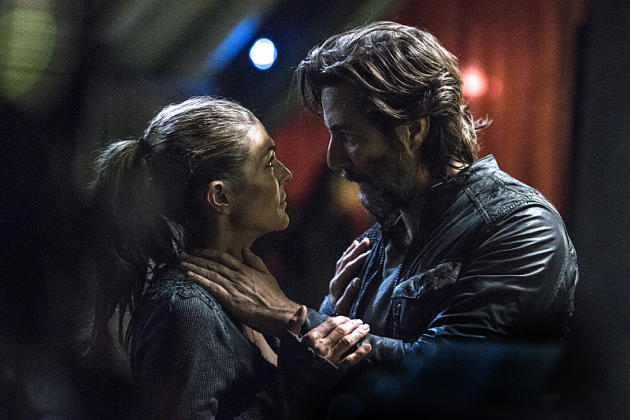
Yay! Our favorite Skaikru grownups got to make out! Gretchen has been a low key Kabby shipper since the show started, so Kane and Abby finally acting on their sexual tension warms the cockles of my salty heart. They’re precious together. Kane wandering through the Polis market, smiling at children, and tasting Grounder food. Abby smiling at him and telling him he’s “a natural at this”. Abby trying to kiss him before his execution and Kane telling her to not make it harder. When he’s broken out of prison but Abby stays behind to help free as many as she can from Jaha’s and ALIE’s clutches.
Ahem. Kane and Abby’s working partnership of equals is a breath of fresh air on a show that has a history of the adult characters squabbling amongst themselves as much as the teenagers do. Kane is the visionary to Abby’s down to earth practicality, and in the first few episodes this season, we get a glimpse of what a peace-oriented power couple could do for Grounder-Skaikru relations. Small wonder they are ousted by Pike’s war-mongering to make room for ALIE to take over. They’re just too strong as a team, especially when the work with the Delinquents instead of condescending to them.
Theirs is also the first (and only) adult romance we’ve been given, which is impressive in and of itself on a teen show. we approve of a strong, intelligent middle-aged woman taking the lead in a romantic relationship. Moar please!
As far as learning or growth this season, we guess Abby learned that she’s not good at being a chancellor and a doctor? We don’t actually see her failing at either, but we’re told she is, repeatedly. Kane learns that nobody likes a diplomat who just wants to give his people the peace they’ve wanted since they landed on the ground. They were both betrayed by someone they love trying to turn them into a villain: Raven forced Abby to swallow the key with graphic self harm; Abby used seduction, torture, and a gun pointed to her head on Kane.
They represent the worst that ALIE can do to two of the kindest, most well-intentioned people this season. Abby’s mama bear protectiveness is exploited and turned on its head. Rather than protecting the people she loves, she manipulates and tortures them. ALIE transforms Kane’s fierce desire to bring peace to Skaikru and Grounders into violence against them. It’s upsetting.
Their reunion in the finale is touching, but if the show were honest, these two would have a lot of baggage to deal with based on what ALIE did to their psyches. Chances are, they’ll breeze right past in S4, rather than explore the ramifications of their time as thralls. They have to help Clarke save the world from a second nuclear apocalypse now; ain’t nobody got time for an emotional aftermath. At least they got to make out?
Octavia

Our smol, angry bb continues her struggle to find a home where she can belong. Her relationship with Lincoln is struggling when the seasons starts: Lincoln has been put under a kill order for disobeying the call to retreat during the Battle of Mt. Weather, trapping him within the safety of Arkadia’s walls. Octavia craves—no, needs—to be away from the dark, cramped hallways of the former Ark, and so she seeks excuses to escape the walls as much as possible. This puts understandable strain on her relationship with Lincoln, but he is taking the situation in stride as of the season 3 premiere; he has chosen to embrace Skaikru and his situation, and is shown living and working together with his new friends.
In the season premiere, Lincoln’s new position within the Skaikru is symbolically expressed when he is gifted with an Ark Guard jacket, showing that he has not only been accepted into the Skaikru fold, but is also being given a position of respect and power. He wears it as a badge of acceptance into Skaikru, no different from the brands of the 13 clans or his Trikru face tattoos. Unfortunately, to Octavia the jacket represents everything hateful about her life on the Ark; the men who abused and eventually killed her mother, the system that trapped her under the floorboards for 16 years, and the culture she has so violently rejected just as it sought to reject her.
_Octavia_Lincoln.jpg/revision/latest?cb=20160513111456&path-prefix=de)
It hurts her deeply to see Lincoln wear that jacket, but they never talk about it; at least, they never talk about what specifically is hurtful about it. She chooses to channel her hurt into hurting Lincoln, accusing him of being their ‘good little grounder,’ and implying that they are dressing him up to demonstrate that the ‘savages’ can be civilized. (She is not entirely wrong on that point.) While Octavia is prone to lashing out in anger and frustration, she does not typically behave this way with Lincoln, and this lack of communication is not consistent with the relationship they’ve had for two seasons. They’ve been the most stable of the on-screen relationships for a long time, and the only relationship to cross multiple on screen seasons.
They have been each other’s home when neither fit comfortably into their native cultures, and yet in season 3 Lincoln consistently prioritizes his acceptance into Skaikru over his relationship with Octavia. While it is not really out of character for Lincoln to be adaptable and to try and make the best of a bad situation, it is out of character for him to do this at Octavia’s expense, and his out-of-character bending to Pike’s will ultimately leads to his death. Lincoln chooses to put his faith in Pike’s word (and Skaikru, by extension) by turning himself in. His faith in humanity is rewarded with betrayal, and for his trouble he gets to die in the most humiliating way possible.
After this, Octavia is adrift, homeless, and winds up helping Clarke and the others stop ALIE because she has nowhere else to go. She stays with the Delinquents, even evincing a ‘change of heart’ (and clothes) that brings her back to considering herself one of The 100 again. The change of clothes is purely symbolic though, as Octavia holds herself apart from the rest of the group even after 3.11. She is driven by a desperation to connect with Lincoln after his death, rather than a genuine desire to help Clarke & Company, as expressed by her protectiveness over his journal. Finding Luna connects her with Lincoln, not The 100. When she finally reconnects with Indra and finds a home there, it seems certain she will leave Skaikru again to be with her. She may help her friends in Skaikru when they need her, but they are not her home.
Unlike her brother, Octavia’s character is remarkably consistent this season. Deep down, Octavia is a warrior; like Princess Leia, she’s a career fighter. It’s why she is more drawn to Grounder culture than her own; that, and the way her native culture literally believes she ought not to exist. She’s fought hard to find a place on the ground: Lincoln was her home, and she rightfully blames Bellamy for his death. She’s going to lash out at him, both emotionally and physically. It’s how she copes with trauma, by inflicting wounds.
We will readily admit that beating up Bellamy is problematic, but it absolutely isn’t out of character. The duration of the beating and his reaction to it make an uncomfortable scene even more disturbing; his martyr-like acceptance of the abuse, even when help is extended, heightens the perception of her violence. It’s uncomfortable to watch, even more so with the racial undertone of a white woman beating a mixed race man. As with much of this season, the scene evinces a failure to adequately understand the cultural context in which this show exists. We’ve said it elsewhere and we’ll say it again: this show does not exist in a vacuum. The scene crosses a line for us, even if it is consistent with her character.
Her arc culminates in the murder of Pike, and it’s not exactly a shock, either. As much as she blames Bellamy, he’s merely a convenient locus for her anger when Pike is out of reach. Once Pike is within her sphere, she’s going to destroy the man that took her whole world from her. Every time she looks at him on screen, you can see what Octavia is planning, feel the hatred radiating off her skin. We still don’t know where she’s going to go after leaving the throne room. All the ways down from the tower are blocked up (implying a darkly hilarious moment about ten minutes later where Octavia stomps back into the throne room and camps out in a corner while glaring daggers in Bellamy’s direction). But wherever she goes and however she gets there, recent interviews have pointed to a ‘darker’ Octavia for season 4. It’s not all that surprising given her trajectory this season.
Jasper

Ah Jasper, the character other than Raven labeled “broken” by Bellamy’s voiceover. He’s drunk, belligerent, isolationist, and grieving when the season begins, and stays that way for most of it. His friends mostly ignore or berate him for his behavior. The few moments of sympathy he is given on screen are few and far between. Monty tries to reach him in 3.04, Octavia lets him cry in 3.02, and Raven believes in him wants to recruit him. Other than that, the dominant attitude around him is annoyance, and it infects the audience’s perception of him.
He’s also the only character given this kind of reaction to grief and PTSD. Everyone else moves on quickly, or heals off screen, if their trauma is addressed at all. It turns Jasper’s grief into less an in-depth exploration of trauma and more into ‘hey look Jasper is having a pity party; he needs to get over himself.’ If he is intended to evoke sympathy, the writers have largely failed.
Moments of forward momentum are marred by the underlying question of whether or not he’ll take the chip. It is difficult to celebrate him opening up to Raven about his love for Maya when it is contextualized by his desire to take it and forget his pain. His attempt to heal and find love with Shay on the rig ends with her dead. Eventually, even his choice is taken away from him when he’s chipped off screen between 3.14 and 3.15. Why? So Monty can struggle. Seriously, the only thing Jasper does as ALIE’s thrall is stab Monty and kidnap Harper, both of which only affect Monty.
In the end, the most we can say about Jasper is that he’s there, and is a jerk. We’re also glad he didn’t kill himself in the finale, as the rumors now seem to suggest.
Lexa

Everyone’s favorite badass lesbean! When the show left off S2, Lexa had betrayed Skaikru at Mt. Weather and gone home to Polis to (presumed) acclaim for saving her people from the transfusion experiments. The decision to irradiate Mt. Weather turned her strength into weakness, and she begins this season at a disadvantage. Clarke has made her look weak in front of her people; to avoid a coup, she must regain the perception of power lost to Clarke. Whether by death or by obeisance, Clarke must submit.
Nevertheless, she’s still the Lexa we knew and loved from last season: ruthless, fierce, capable of making deals and just as capable of changing the terms to better suit her needs. Most of all, she’s concerned about Clarke. Her characterization is one of, if not the most consistent across both seasons (other than Murphy). Once again, when faced with destroying an enemy or making a deal, she chooses to make a deal with Skaikru and have them join her Coalition. Once again, she chooses overt displays of ruthlessness when surrounded by her subordinates to maintain her control over a potentially volatile situation. She reacts to the slaughter of the 300 by mustering troops to declare war on Arkadia. She confronts Clarke when she thinks she is being hypocritical. She fights her own battles and wins.
She is also growing as a character. Despite her assertions in S2 that ‘love is weakness’, she is opening up to Clarke. The shell she made for herself when Costia died—the performance of power to protect herself from being hurt that she created and Titus fostered—continues to chip away. We see her teaching the natblida novitiates about compassion being one of three pillars of the commander. She chooses mercy for Arkadia rather than vengeance. She allows Clarke to choose how to deal with Emerson. She lets herself love and be happy.

Blood must not have blood. She’s looking to the future of the Grounders as a whole rather than to the present (survival) or the past (retribution). Clarke’s last-ditch effort to save her people from utter annihilation becomes Lexa’s rallying cry for a new way forward. Rather than being a sign of her giving into her emotions (as Titus, wrongly, believes), Lexa choses mercy because she believes it is the best thing for her people.
“The crimes of the Mountain cannot be answered by one man. Wanheda knows this. Her actions show us a promise for a new future, a world in which violence does not always answer violence. A world in which our children can flourish without the shadow of death.” — Lexa, 3.03
Yet even in this moment, we see that to her, mercy does not undermine justice. Mercy may also be cruel, and still be mercy. Justice can be harsh, but not deadly. She’s redefining her words and her world to better suit her evolving understanding of what is important in life. If love is weakness, mercy is too. But if love is not weakness, if love is strength, then mercy can be as well. And she wields it as she wields her sword(s): deftly and with brutal accuracy. She’s an anti-hero turned hero who, in the process of transformation, lost nothing of what made her compelling in the first place. If anything, we love her more for her evolution, not less.
Devastatingly, her character growth and trajectory are cut short by a stray bullet of plot convenience in 3.07, as was Jason Rothenberg’s credibility as a writer who respects his LGBT audience.
R.I.P Heda
Monty

Very little can be said about Monty this season other than that he deals with his trauma remarkably well. Like Clarke, he’s almost too mature in his handling of everything, to the point that it appears as though the narrative does not want to depict him coping negatively at all. He yells at Raven, once. Other than that, he’s his normal self: concerned, selfless, stoic, more worried about other’s pain than his own. They’re admirable traits, but We’d like to see Monty display some depth of emotion now and again. He had to kill his mother twice this season for crying out loud. The mother he thought was dead. Give the man more than mantras about how ‘it wasn’t her.’
Not that their relationship when she was alive had much nuance or tension. Even when the reunited, he seemed more conflicted about her presence than genuinely glad. His choices lacked tension, despite their best efforts, because Monty always does the right thing in the end. Killing his mother, deleting his mother, not opening the door for Jasper, not destroying the machine to get Harper back, these choices have no dramatic value. As when Clarke pulls the kill switch, the audience knows what choices Monty will make already.
Monty is almost always subordinated in his sub-plots, and this season is no exception. Whether it be to Jasper, Raven, or Bellamy, Monty arc almost always revolves around him supporting the main action for others. Other than his interactions with his mother, the only event that is truly his own is his relationship with Harper, which has zero lead up and exists merely to cause him pain in the finale. Monty’s a nice guy, really. He’s a concerned, loyal, and caring friend. We like him, but he’s a flat this season.
Characterization Summary
Rothenberg’s desire to tell ALIE’s story warps everything around it. Bellamy’s character? Assassinated. Clarke’s? Given growth early on but stunted to service Bellamy’s ‘redemption’ arc in 3B. Jaha is a prop and a mouthpiece whose existence in the plot makes less sense as the season progresses. Lincoln is barely even allowed to participate in the story. Kane, Abby, Monty, and Harper, are in character, but flat.
Octavia is remarkably in character, but her actions have problematic implications that are never fully explored. Jasper is an unsympathetic jerk. The only characters who grow or change at all are Murphy, Raven, and Lexa. Murphy’s and Raven’s growth are incidental to the narrative and possibly even accidental. Only Lexa evinces a clearly intentional upward trajectory, but it’s literally shot. When your only example of complex character development in a season is for a guest star (even one as compelling as Lexa), you have problem in your writer’s room.
Other Characterization Issues
- Hannah Green: She’s barely a character. She’s Pike’s echo chamber and despite having the possibility of nuance—interacting with her long lost son, her sorrow over the death of the farm station children—it’s all thrown out the window. Rather than making her anti-violence towards children, her witnessing the death of the skaikru children only fosters her willingness to kill Grounder children and even endanger her own child. Then she’s killed of to fuel Monty’s pain. Twice.

Raven is both literally and figuratively stronger than the rest of Arkadia. - ALIE destroys personalities: We mentioned this with Abby and Kane. ALIE doesn’t just prevent pain, she destroys established characterizations when people become her thralls. Kane, Abby, Jaha, Emori, they’re all basically mindless puppets for Abby to use as she wishes. Only Raven resists and retains an element of her personality. Because she’s Special™, Strong™ (Read: Not Like Other Girls™). As much as we love Raven, she’s more than a special snowflake prop for ALIE’s story arc, tyvm.
- Gina: She’s on screen for all of three minutes. The audience barely has enough time to form an emotional attachment to her as a character, much less believe Bellamy loved her enough to murder his former friends for her. Why does he always leave her behind? Where did she come from? Why didn’t we get more awesome Raven/Gina snarking?
Stay tuned yet again for the rousing conclusion of this retrospective series where we’ll discuss themes, as well as our final thoughts on the season.
All images from The 100 courtesy of Warner Bros.


